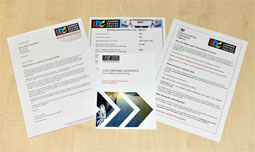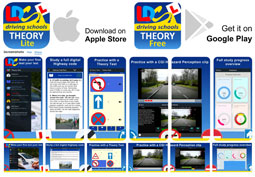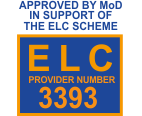Driving lesson 10. Traffic signals & pedestrian crossings
Introduction
Junctions that have larger volumes of traffic where major roads intersect or that are more complex are normally controlled by traffic lights. Also on these busier roads you will encounter various types of pedestrian crossings.
Key learning notes
Traffic signals
As you drive around you will encounter many traffic light controlled junctions. All of the signals follow the same sequence and meaning.
| RED - this signal means stop behind the stop line. | |
| RED & AMBER - this signal means stop. Do not pass through or start until GREEN shows. | |
| GREEN - this signal means you may go if the way is clear. | |
| AMBER - this signal means stop at the stop line. You may go if the AMBER appears after you have crossed the stop line or if you are so close to it that to pull up might cause an accident. | |
| GREEN ARROW - this signal may be provided in addition to the full green signal if movement in a certain direction is allowed before or after the full green phase. If the way is clear you may go but only in the direction shown by the arrow. You may do this even when other lights may be showing. |
Priorities
Even though you may have a green light indicating that you can proceed this does not change priorities with regards to oncoming vehicles.
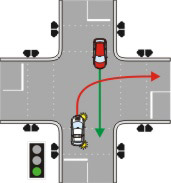
 This sign is often used on the approach to traffic lights. If you see it, be prepared for possible traffic queues ahead and be ready to stop. You must always obey the signals, even if the lights are only temporary, for example at roadworks.
This sign is often used on the approach to traffic lights. If you see it, be prepared for possible traffic queues ahead and be ready to stop. You must always obey the signals, even if the lights are only temporary, for example at roadworks.
 These red lights flash alternately and mean that you must give way to trains or emergency vehicles emerging from their depot. The steady amber light warns you that the red lights are about to show.
These red lights flash alternately and mean that you must give way to trains or emergency vehicles emerging from their depot. The steady amber light warns you that the red lights are about to show.
Level crossing
A level crossing is where a road crosses a railway or tram line. Always approach and cross level crossings with care. Be on the look out for signs warning you of a level crossing ahead.
Whilst in a queue of traffic at a level crossing it is important not to get too close to the car in front. Only start to cross a level crossing when the road on the other side is clear and there is sufficient room for your car. Once the barriers have lifted and the lights have gone out you can go, do not try to zigzag around the barriers as they are lifting into the upright position.
In the event of your car breaking down on a railway crossing you must firstly, get your passengers to safety; secondly, if there is a railway telephone use it to warn the signal operator and thirdly, if possible, push the car off the crossing (however, if the alarm rings or the amber light comes on get well clear of the crossing).
Pedestrian crossings
There are several types of pedestrian crossing. In each case you must try to identify the crossing early and use your hazard drill.
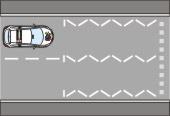
The zigzag lines at these crossings act as a warning that there is a pedestrian crossing ahead and mark an area where you must not park or overtake. You must be careful not to cross over the studded give way line if you cannot clear the crossing area. Apart from the zebra crossing all the other crossings are light controlled and push button operated.
 It is important at a crossing that you never beckon a pedestrian onto the crossing as you may be inviting them into danger from traffic travelling in the opposite direction.
It is important at a crossing that you never beckon a pedestrian onto the crossing as you may be inviting them into danger from traffic travelling in the opposite direction.
Zebra crossing
The yellow flashing light on the diagram below is a 'Belisha beacon'. This marks the location of a zebra crossing, where you see this light you must be prepared to stop and give way to any pedestrians waiting to cross. Once a pedestrian has stepped onto the crossing you must give way and stop.
![]()
Pelican crossing
These crossings have a flashing amber phase during the traffic light sequence which requires drivers to give way to pedestrians on the crossing. However, if the crossing is clear you may proceed. At some pelican crossings the pedestrian will hear a bleeping sound to indicate to blind or partially-sighted people that the steady green figure is showing so they can cross safely.

Puffin crossing
These crossings have sensors mounted on top of the traffic lights. The crossing is activated by pressing a button on the yellow box. When the signals change to red for the traffic, the sensors will sense movement on the crossing and keep the traffic lights at red until no movement is detected.

Toucan crossing
Toucan crossings work in exactly the same way as Pelican crossings except there is no flashing amber phase. They are designed to be used by pedestrians and cyclists at the same time. Cyclists do not need to dismount.
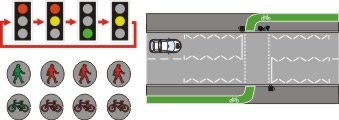
Equestrian (Pegasus) crossing
A Pegasus crossing is located where a bridleway crosses a major road. At the side of the crossing there will be a fenced area for horses to wait. The sequence and meaning of the lights at this crossing are the same as a Toucan crossing. It may be possible for both pedestrians and horses to cross at this type of crossing, if this is the case there may be two separate crossings.
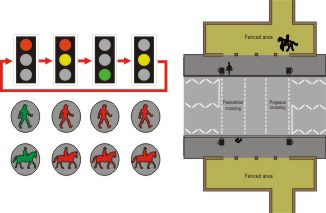
Traffic light crossing
A pedestrian crossing can be incorporated into a normal set of traffic lights. It is still operated by a push button and the crossing area is clearly marked by two rows of studs.
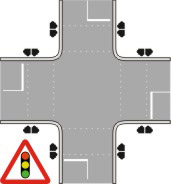
School crossing patrol
The flashing lights on the warning sign inform drivers that a school crossing patrol is ahead. You must give way to the 'lollipop lady' or 'gentleman' on duty and be particularly careful as children will be crossing the road.
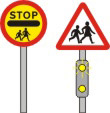
Highway Code study
Rules: 109, 174 - 178, 191 - 199, 210, 291 - 299.


